Journal Description
Merits
Merits
is an international, peer-reviewed, open access journal on virtues, talents and human resources published quarterly online by MDPI.
- Open Access— free for readers, with article processing charges (APC) paid by authors or their institutions.
- Rapid Publication: manuscripts are peer-reviewed and a first decision is provided to authors approximately 37.6 days after submission; acceptance to publication is undertaken in 5.9 days (median values for papers published in this journal in the second half of 2023).
- Recognition of Reviewers: APC discount vouchers, optional signed peer review, and reviewer names published annually in the journal.
- Merits is a companion journal of Sustainability.
Latest Articles
Knowledge of Infection Prevention and Control and Practice Behaviors among Career and Volunteer Firefighters in Rural Communities
Merits 2024, 4(2), 146-158; https://doi.org/10.3390/merits4020011 - 10 Apr 2024
Abstract
Due to the emerging threat conditions in the work environment, firefighters are at a high risk of exposure to not only toxic substances but also biological agents in the dayroom and during emergency runs. The aim of this study is to evaluate firefighter
[...] Read more.
Due to the emerging threat conditions in the work environment, firefighters are at a high risk of exposure to not only toxic substances but also biological agents in the dayroom and during emergency runs. The aim of this study is to evaluate firefighter (career and volunteer) knowledge and practice behaviors on infection control. This study surveyed 444 firefighters (210 career, 234 volunteer) in rural Northwestern Kentucky. The self-reported survey focused on individual characteristics, knowledge on exposure incident control, precautionary actions, and personal protections. We evaluated the descriptive characteristics of knowledge and practice scores stratified by firefighter groups (career and volunteers). The associations between infection control training received (yes/no) and firefighter knowledge and practice scores were also examined. Firefighters who were trained on infection control prevention had significantly higher knowledge scores (M = 63.7, SD = 13.4 vs. M = 59.7, SD = 15.9; p = 0.012). Volunteer firefighters exhibited better infection control practice behaviors than career firefighters (M = 70.6, SD = 13.0 vs. M = 67.4, SD = 11.1; p = 0.05). Firefighters who followed infection control guidelines (M = 69.5, SD = 11.9 vs. M = 58.1, SD = 9.9; p = 0.012) and expressed need for a comprehensive training on personal protective equipment (PPE) selection (β = 3.41, SE = 1.54, aOR = 30.22, 95% CI: 1.47–620.87; p = 0.028) had significantly higher practice scores compared to those who did not. The study results have policy implications for infection prevention and control (IPC) in rural fire departments, both career and volunteer. A review of infection control policies is needed, especially as it relates to training and practice behaviors during emergency calls and in the dayroom. Results also suggest the need to develop strategies to improve the culture of PPE use and training on the selection of PPEs appropriate to the emergency response type.
Full article
(This article belongs to the Special Issue Current Research on Occupational Safety and Health)
Open AccessArticle
Exploring the Influence of Crime on NEET Rates: A Regional Analysis of Italy
by
Iacopo Odoardi, Dario D’Ingiullo, Ada Di Nucci and Davide Quaglione
Merits 2024, 4(2), 132-145; https://doi.org/10.3390/merits4020010 - 10 Apr 2024
Abstract
The occurrence of criminal activities has the potential to hinder socioeconomic advancement, preventing individuals from investing in human capital and pursuing employment opportunities. Our investigation focuses on the hypothesis that the NEET (not in education, employment, or training) rate is related to crime
[...] Read more.
The occurrence of criminal activities has the potential to hinder socioeconomic advancement, preventing individuals from investing in human capital and pursuing employment opportunities. Our investigation focuses on the hypothesis that the NEET (not in education, employment, or training) rate is related to crime levels. Through an econometric analysis based on regional data, we examine the impact of crimes against property and against persons on NEET rates within central-northern and southern Italy, while controlling for prevalent determinants of the NEET phenomenon. Our findings reveal that, compared with prevailing discouragement factors such as youth unemployment and lack of interest in tertiary education, crime exerts a more pronounced influence on elevating NEET rates. This effect is particularly evident in the relatively less developed southern regions, where violent crimes, although relatively uncommon, may disproportionately contribute to feelings of apprehension and uncertainty regarding future prospects.
Full article
(This article belongs to the Special Issue Young People and the Labor Market: Challenges and Opportunities)
Open AccessProject Report
Training to Achieve Sustainable Employment for Youth and Young Adults
by
Cristina de Sousa and Fernando Acabado Romana
Merits 2024, 4(2), 118-131; https://doi.org/10.3390/merits4020009 - 08 Apr 2024
Abstract
This paper presents the outcomes of the “Training for Sustainable Employment of Youth and Young Adults” project, originally developed with the assistance of a consortium of institutions in six countries. These countries comprised five EU member states, Portugal, Italy, Romania, the Czech Republic,
[...] Read more.
This paper presents the outcomes of the “Training for Sustainable Employment of Youth and Young Adults” project, originally developed with the assistance of a consortium of institutions in six countries. These countries comprised five EU member states, Portugal, Italy, Romania, the Czech Republic, and Spain, and an EU candidate, Turkey. The main objective of the project was to analyse the gap between the needs of employers and the skill sets of youth and young adults, in order to assess the training needs of young people to equip them to be sustainably employed. In addition, the project set out to create a course programme that contained targeted training to meet the identified training needs of both employers and young people. The data collection was performed using a focus group (n = 144) and an online survey aimed at a convenience sample of the target groups (n = 244) in the six participating countries. The data were analysed qualitatively and quantitatively. The findings indicated six main competencies to develop in training: flexibility, inclusivity, diversity, and wellbeing; innovation and knowledge management; mobilisation of human resources; international orientation; entrepreneurship; and presentation. In conclusion, this study illustrated the need for a course programme to be established, structured around the six categories that correspond to the main topics obtained through the consortium’s research. Therefore, the main gain of the project study was the creation of a course programme, focused on improving young people’s inclusion in the job market and meeting companies’ needs for skilled employees.
Full article
(This article belongs to the Special Issue Young People and the Labor Market: Challenges and Opportunities)
►▼
Show Figures
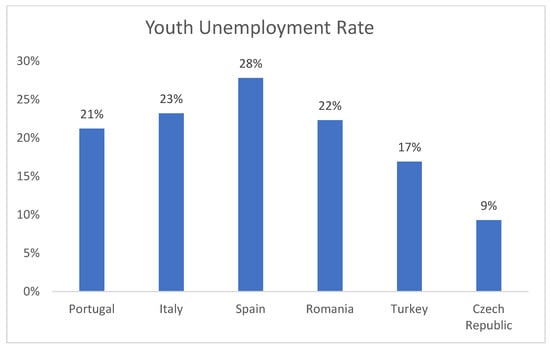
Figure 1
Open AccessBrief Report
Does Changing Scale Items’ Contexts Impact Its Psychometric Properties? A Comparison Using the PERMA-Profiler and the Workplace PERMA-Profiler
by
Sean P. M. Rice
Merits 2024, 4(2), 109-117; https://doi.org/10.3390/merits4020008 - 26 Mar 2024
Abstract
The present study evaluated the empirical distinction between the PERMA-Profiler and the Workplace PERMA-Profiler, which measure flourishing using the same items with different contexts (i.e., general vs. workplace orientations). Both scales were administered online via MTurk (N = 601), and single-group measurement
[...] Read more.
The present study evaluated the empirical distinction between the PERMA-Profiler and the Workplace PERMA-Profiler, which measure flourishing using the same items with different contexts (i.e., general vs. workplace orientations). Both scales were administered online via MTurk (N = 601), and single-group measurement and structural invariances were assessed. Partial metric and scalar invariances were supported, indicating that the PERMA constructs were measured equivalently across scales (except for the relationships factor). Structural properties (covariances, means) were not invariant, indicating distinct utility for each scale in their respective contexts. The results suggest that simple adaptations to items to change their context, but not content, may retain the original scale’s psychometric properties and function with discrimination.
Full article
Open AccessArticle
Capacitating Pedagogy to Inclusive Excellence through Bienvivance for Zero Waste of Human Resources: European Case Studies during the Lockdown on Vocational Education and Training
by
Bénédicte Gendron
Merits 2024, 4(1), 95-108; https://doi.org/10.3390/merits4010007 - 19 Mar 2024
Abstract
The lockdown during the pandemic questioned the learning and working conditions but underlined crucially the teaching pedagogy and new essential teachers’ roles and competencies, and on the whole, the operational framework of education for quality of education for all. The research was carried
[...] Read more.
The lockdown during the pandemic questioned the learning and working conditions but underlined crucially the teaching pedagogy and new essential teachers’ roles and competencies, and on the whole, the operational framework of education for quality of education for all. The research was carried out through a European Project and gathered at training centers in two countries focusing on learning and pedagogical issues during the lockdown through focus group discussion methodology and labels analysis. If planning, material resources, and health issues came out as relevant difficulty categories, the findings underlined collaborative projects and capacitating pedagogy as efficient and helpful. The findings also questioned the quality-of-life framework at school and the teaching pedagogy and new teachers’ roles as competencies to cope with such a situation to support transformative learning. The outcomes suggested a positive operational framework, the innovative bienvivance paradigm, derived from medical methodology, which can help school organizations by inner development for outer changes to integrate diversity, equity, and educational quality efforts into their missions. It aims at serving inclusive excellence toward human resource sustainability and zero waste of human resources. It can be seen as an effective framework for quality and equity in education. It supports the UN and UNESCO recommendations and the psycho-socio-economic optimization of human resource issues, which are crucial in these human resource mobility and migrations waves, and broadly copes with global changes.
Full article
(This article belongs to the Special Issue School Management and Effectiveness)
Open AccessArticle
Be the Change You Want to See: Problem-Based Learning to Promote Diversity, Justice, Equity, Inclusion, Belonging, and Sustainability in the Classroom and Workplace
by
Franziska M. Renz and Julian U. N. Vogel
Merits 2024, 4(1), 79-94; https://doi.org/10.3390/merits4010006 - 01 Mar 2024
Abstract
This study presents a problem-based learning (i.e., PBL) assignment to engage students around the areas of diversity, justice, equity, inclusion, belonging (i.e., DEI), and sustainability in the classroom and workplace. The assignment is developed based on the learning objectives of an upper division
[...] Read more.
This study presents a problem-based learning (i.e., PBL) assignment to engage students around the areas of diversity, justice, equity, inclusion, belonging (i.e., DEI), and sustainability in the classroom and workplace. The assignment is developed based on the learning objectives of an upper division business course following an outlined three-step process. A pretest-posttest research design with a control group demonstrates that the experiential assignment is effective in enhancing students’ problem-solving skills which, according to employers, recent college graduates need to improve upon. The PBL approach also increases students’ interest in DEI and sustainability so that they want to make a difference in society. While students’ confidence in their preparedness to become a manager decreases over the course of a semester, this loss in confidence is mitigated by students’ active participation in the PBL assignment.
Full article
(This article belongs to the Special Issue People—the Next Sustainability Frontier)
Open AccessArticle
Ohio’s 5G and Broadband Workforce: Assessing the Current Landscape Using Skillshed Analysis
by
Ryan Humeniuk, Elham Erfanian and G. Jason Jolley
Merits 2024, 4(1), 66-78; https://doi.org/10.3390/merits4010005 - 23 Feb 2024
Cited by 1
Abstract
Ohio’s 5G and broadband industry is rapidly changing. In this study, we assess the current skills and skills gaps of the state’s workforce and the supply and demand of labor within the 5G and broadband industry. We use a skillshed analysis to determine
[...] Read more.
Ohio’s 5G and broadband industry is rapidly changing. In this study, we assess the current skills and skills gaps of the state’s workforce and the supply and demand of labor within the 5G and broadband industry. We use a skillshed analysis to determine declining occupations with easy and challenging transitions into 5G and broadband occupations. Based on the analysis, we determine where skills gaps exist and where additional resources are needed to prepare the state’s workforce for the 5G and broadband industry.
Full article
Open AccessArticle
Key Factors of Organizational Resilience in Prisons and Police Forces in French-Speaking Switzerland during COVID-19
by
Camille Giovannini and David Giauque
Merits 2024, 4(1), 51-65; https://doi.org/10.3390/merits4010004 - 07 Feb 2024
Abstract
During the COVID-19 crisis, organizations had to demonstrate organizational resilience (OR) to continue to carry out their missions. We conducted qualitative research to identify the factors that contributed to the OR of police and penitentiary institutions in French-speaking Switzerland, in terms of their
[...] Read more.
During the COVID-19 crisis, organizations had to demonstrate organizational resilience (OR) to continue to carry out their missions. We conducted qualitative research to identify the factors that contributed to the OR of police and penitentiary institutions in French-speaking Switzerland, in terms of their operations and management. The modes of action and crisis responses of these emergency services, regularly confronted with crises and particularly impacted during the pandemic, are worthy of attention. To this end, we synthesized the OR factors that are frequently identified in both theoretical and empirical review articles and identified four theoretical conceptualizations: (a) resilience engineering, (b) ecological resilience (these two are the most widely used), (c) a third way situating resilience at an intermediate stage in a metamodel representing the evolution of organizations from a fragile to antifragile state, and (d) a conceptualization focusing on the temporal dimension of OR. Based on the results of 25 semi-structured interviews with executives from cantonal police forces and prisons, we present what we consider to be the key levers in a three-phase resilience process (upstream, during, and after the shock): anticipatory and proactive organizational culture, information management and communication, liminal leadership practices, social and environmental practices, agility-enhancing governance practices, and learning capabilities. Our results largely confirm that these parameters significantly contributed to the OR of the institutions in question. They also enable us to propose winning configurations of factors that can increase the potential for OR.
Full article
Open AccessArticle
Workplace Leadership Development Practices: An Environmental Scan
by
Roslyn Cameron, Christine Edwards and Gregory Harper
Merits 2024, 4(1), 35-50; https://doi.org/10.3390/merits4010003 - 06 Feb 2024
Abstract
Effective workplace leadership development programs are considered critical to organizational adaptive capacity and sustainability. The purpose of this exploratory study is to conduct an environmental scan of contemporary practices and approaches to leadership and management development programs in Australian workplaces. An online survey
[...] Read more.
Effective workplace leadership development programs are considered critical to organizational adaptive capacity and sustainability. The purpose of this exploratory study is to conduct an environmental scan of contemporary practices and approaches to leadership and management development programs in Australian workplaces. An online survey was distributed to a sample of Australian human resource professionals given the field’s strong practitioner orientation. The survey sample includes members of the Australian Human Resources Institute (AHRI), the professional body for human resource professionals and practitioners in Australia. The findings indicate a substantial majority of the current practice is not informed by evidence-based theory or practice. The most commonly used model is 70:20:10, which lacks a coherent evidence base and has been widely criticized for that reason. The findings point to the frequent application of bespoke leadership frameworks and significant theory–practice gaps. While organizations cite “ensuring delivery of business results”, as the main driver for instigating leadership development programs, with support from top management being crucial to the effectiveness and success of leadership development programs/interventions, evaluation and measurement of impact and return on investment remains problematic. Based on these insights, we present a future research agenda for monitoring and evaluating leadership development programs that will build a stronger theoretical foundation to inform evidence-based practice.
Full article
(This article belongs to the Special Issue Leadership in the Workplace)
►▼
Show Figures
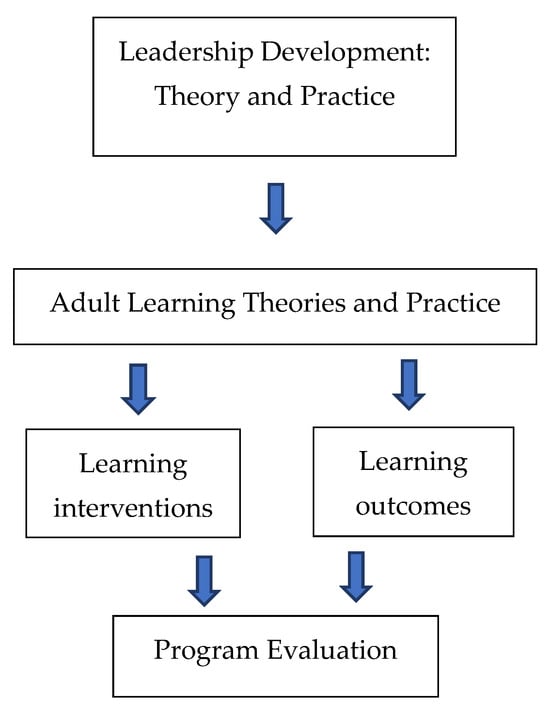
Figure 1
Open AccessArticle
A Multilevel Analysis of Changes in Psychological Demands over Time on Employee Burnout
by
Annick Parent-Lamarche, Alain Marchand and Sabine Saade
Merits 2024, 4(1), 19-34; https://doi.org/10.3390/merits4010002 - 03 Feb 2024
Abstract
►▼
Show Figures
In pursuing this study, we were interested in the effect of changes in psychological demands over time on burnout. We were also interested in examining the moderating role resources could play between changes in job demands over time and employee burnout. Multilevel regression
[...] Read more.
In pursuing this study, we were interested in the effect of changes in psychological demands over time on burnout. We were also interested in examining the moderating role resources could play between changes in job demands over time and employee burnout. Multilevel regression analyses of repeated measures were conducted to capture the hierarchical structure of the data (time (Level 1, n = 537 (12-month period between T1 and T2)); employees (Level 2, n = 289)) nested in firms (Level 3, n = 34). To measure change in psychological demands, the distribution of psychological demands at T1 and T2 were dichotomized at the T1 median. Following this dichotomization, four groups were created: low T1 and low T2; high T1 and low T2; low T1 and high T2, high T1 and high T2. In terms of direct associations, an increase in psychological demands over time was associated with emotional exhaustion and cynicism but not professional efficacy. Locus of control, self-esteem, and social support from supervisors were also directly associated with burnout. As for interaction effects, social support from coworkers attenuated the effect of changes in psychological demands over time (i.e., increasing psychological demands) on cynicism. In other words, employees facing greater psychological demands over time (increasing psychological demands) and benefitting from social support from their coworkers had less cynicism. Our findings offer meaningful insights into possible ways of lowering burnout levels. Based on the results obtained, psychological demands, social support, locus of control, and self-esteem should be considered valuable intervention targets.
Full article

Figure 1
Open AccessArticle
Workloads of Emergency Call Types in Active-Duty Firefighters
by
Rudi A. Marciniak, David J. Cornell, Barbara B. Meyer, Razia Azen, Michael D. Laiosa and Kyle T. Ebersole
Merits 2024, 4(1), 1-18; https://doi.org/10.3390/merits4010001 - 30 Jan 2024
Abstract
Firefighting is an occupation with high injury risks, particularly when conducting fireground operations. The fire service generally quantifies the job demands of firefighting through tracking emergency call volume across 24 h shifts; however, volume alone does not account for the specific work completed
[...] Read more.
Firefighting is an occupation with high injury risks, particularly when conducting fireground operations. The fire service generally quantifies the job demands of firefighting through tracking emergency call volume across 24 h shifts; however, volume alone does not account for the specific work completed in response to different call types. Utilization of external (i.e., objective work) and internal (i.e., intrinsic responses to work) training load measures have the potential to quantify the multifaceted workload demands of responses to medical and fire emergencies and inform injury prevention strategies. Therefore, the purpose of this study was to utilize training load measures to quantify the workloads across emergency call types. For medical emergencies and fire emergencies, the external load and the physiological, perceived, and cumulative internal loads were quantified. The results indicate that the magnitude of objective work required for fire emergency responses that include fire suppression and/or auto-extrication is approximately three times greater than that of medical and other fire emergency (i.e., no suppression or extrication) responses. Further, in response to the objective work for fire suppression and/or auto-extrication calls, the intrinsic workloads are six times more physiologically and perceptually demanding than—as well as double, cumulatively—those of medical and other fire emergency responses.
Full article
(This article belongs to the Special Issue Current Research on Occupational Safety and Health)
►▼
Show Figures
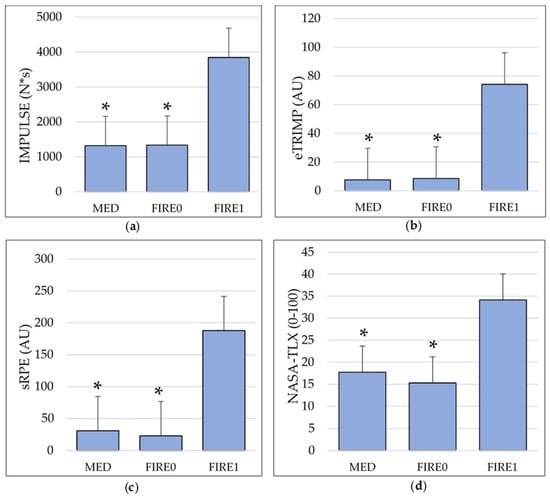
Figure 1
Open AccessPerspective
Dynamic Evaluation Approaches to Telehealth Technologies and Artificial Intelligence (AI) Telemedicine Applications in Healthcare and Biotechnology Organizations
by
Darrell Norman Burrell
Merits 2023, 3(4), 700-721; https://doi.org/10.3390/merits3040042 - 06 Dec 2023
Abstract
The COVID-19 pandemic has ushered in an unprecedented adoption and integration of telehealth and artificial intelligence (AI) driven by telemedicine technologies into healthcare systems worldwide. These innovations promise to revolutionize healthcare delivery by offering greater accessibility, efficiency, and responsiveness to patient needs. However,
[...] Read more.
The COVID-19 pandemic has ushered in an unprecedented adoption and integration of telehealth and artificial intelligence (AI) driven by telemedicine technologies into healthcare systems worldwide. These innovations promise to revolutionize healthcare delivery by offering greater accessibility, efficiency, and responsiveness to patient needs. However, the rapid deployment of these technologies in response to the crisis has illuminated the imperative need for systematic evaluation processes that comprehensively assess their operations and outcomes. This article underscores the critical importance of developing rigorous evaluation frameworks tailored to the evolving landscape of telehealth and AI-driven telemedicine technologies. The absence of standardized evaluation processes presents multifaceted challenges including uncertainties regarding long-term efficacy, patient safety, data security, and ethical considerations. Ensuring the responsible and effective integration of telehealth and AI into healthcare systems requires adaptable, multidimensional evaluation mechanisms that align with clinical objectives and regulatory standards. Through an examination of documents, procedures, policies, and best practices by regional hospitals, this article advocates for developing evaluation processes that enable stakeholders to optimize the deployment of telehealth and AI technologies fostering patient-centered care while addressing emerging challenges. In an era marked by healthcare transformation, establishing robust evaluation frameworks emerges as a paramount endeavor essential for realizing the full potential of telehealth and AI-driven telemedicine in the post-COVID-19 healthcare ecosystem.
Full article
Open AccessArticle
Intersection of Gender and Disability on Returns to Education: A Case from Metro Manila, Philippines
by
Kamal Lamichhane and Takayuki Watanabe
Merits 2023, 3(4), 682-699; https://doi.org/10.3390/merits3040041 - 30 Nov 2023
Abstract
Utilizing a dataset from Metro Manila in the Philippines, we estimate the impact of gender on the return of education for individuals with disabilities, specifically focusing on visual, hearing, and walking difficulties. Controlling sample selection to address endogenous labor participation and accounting for
[...] Read more.
Utilizing a dataset from Metro Manila in the Philippines, we estimate the impact of gender on the return of education for individuals with disabilities, specifically focusing on visual, hearing, and walking difficulties. Controlling sample selection to address endogenous labor participation and accounting for the endogeneity of schooling decisions, our estimations reveal a significant rate of return to education, ranging from 25.7% to 38.1%. Importantly, examining the potential for nonlinear-schooling return, we observe a more pronounced effect of disability for females compared to their male counterparts, suggesting the presence of dual discrimination and signaling effects for females. Our research emphasizes the urgency for the Philippine government to not only improve educational opportunities but also to enhance employment prospects, particularly for females with disabilities. Some of the policy recommendations would include the implementation of equal-opportunity measures, including antidiscrimination policies; an expanded quota system to boost employment opportunities; efforts to address accessibility issues; and subsidies for private-sector employment are also necessary for the economic empowerment of females with disabilities.
Full article
(This article belongs to the Special Issue Young People and the Labor Market: Challenges and Opportunities)
►▼
Show Figures
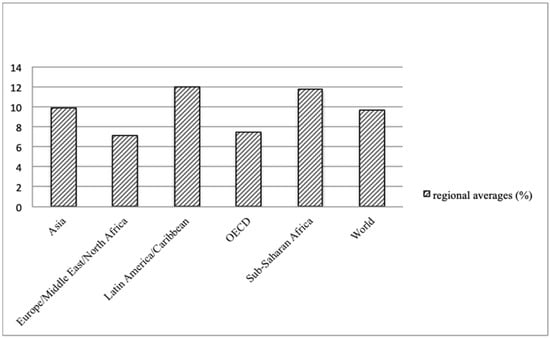
Figure 1
Open AccessArticle
The Psychological Effects of Relational Job Characteristics Scale: An Adaptation Study for Brazilian K-12 Teachers
by
Natan Klein, Carlos Costa, João P. Marôco, Cicero Roberto Pereira and Maria José Chambel
Merits 2023, 3(4), 668-681; https://doi.org/10.3390/merits3040040 - 29 Nov 2023
Abstract
►▼
Show Figures
Relationally enriched jobs can foster psychological states, which, with respect to the beneficiaries of one’s work, drive one’s motivation. These states can be measured with the psychological effects of relational job characteristics scale, an instrument for which the validity is, at present, only
[...] Read more.
Relationally enriched jobs can foster psychological states, which, with respect to the beneficiaries of one’s work, drive one’s motivation. These states can be measured with the psychological effects of relational job characteristics scale, an instrument for which the validity is, at present, only supported by preliminary evidence. Accordingly, the present study’s objective was to test a set of psychometric properties reflecting the validity and reliability of the interpretations proposed for this scale. Findings drawn from a sample of 2011 K-12 Brazilian teachers suggested that a tridimensional structure with some residual covariances afforded the best fit. Given the existence of high inter-factor correlations, a second-order factor was proposed as a complementary, if not necessary, feature. Internal consistency omega and alpha coefficients attested to the scores’ reliability, and the factor structure achieved indicates invariance across public state, public municipal, and private Brazilian schools. Different relationships with prosocial motivation and work engagement were identified, suggesting validity of the scale based on relationships with other variables.
Full article
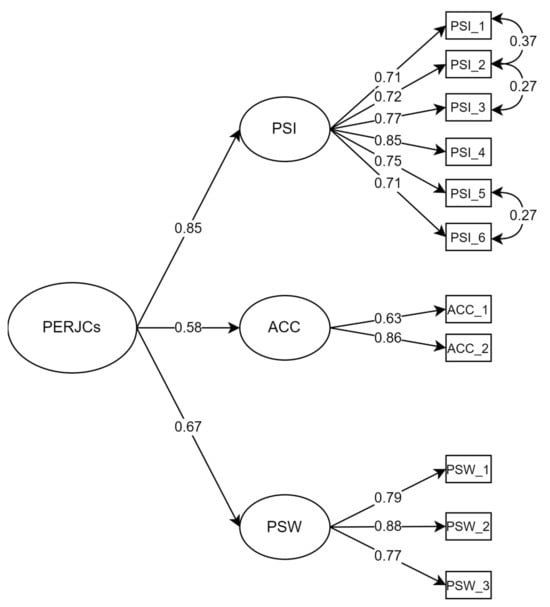
Figure 1
Open AccessArticle
Non-Native English-Speaking Teachers and Self-Appreciation: How Non-Native English-Speaking Teachers Can Gain Equity by Learning to Appreciate Themselves
by
Simon Perry
Merits 2023, 3(4), 654-667; https://doi.org/10.3390/merits3040039 - 13 Nov 2023
Abstract
This research paper explores how non-native English-speaking teachers can consider using their multilingualism and transnationalism as assets in creating competitive portfolios fit for the 21st century linguistic marketplace. This enhancement in the portfolio to attract credit as ‘investors of the self’ is an
[...] Read more.
This research paper explores how non-native English-speaking teachers can consider using their multilingualism and transnationalism as assets in creating competitive portfolios fit for the 21st century linguistic marketplace. This enhancement in the portfolio to attract credit as ‘investors of the self’ is an aspect of human capital that can be utilized by non-native English-speaking teachers to enhance their self-esteem. This, in turn, can encourage potential investors to view non-native English-speaking teachers as relevant players in a global landscape that appreciates linguistic diversity and pluralism, as well as transnational experience. This research was conducted by performing interviews with non-native English-speaking teachers and an analysis of website 2.0 sources, aiming to gain insights into the opinions of non-native English-speaking teachers regarding their human capital and how new approaches can aid their equity within the field of English language teaching. The results demonstrated a desire in teachers to utilize their inherent skillsets comprising multilingual and transnational capabilities.
Full article
(This article belongs to the Special Issue School Management and Effectiveness)
Open AccessSystematic Review
Ageing Organizations: Reviewing the Literature and Making a Few Recommendations for Human Resource Management
by
Alfredo Salomão Filho, Tanja Tillmanns and Trudy Corrigan
Merits 2023, 3(4), 640-653; https://doi.org/10.3390/merits3040038 - 26 Oct 2023
Abstract
►▼
Show Figures
In an ageing society, organizations must consider the inclusion and effective management of older professionals if they wish to remain competitive. Besides having harmful and far-reaching effects on people’s health, age discrimination in the workplace leads to absenteeism, lower levels of productivity, and
[...] Read more.
In an ageing society, organizations must consider the inclusion and effective management of older professionals if they wish to remain competitive. Besides having harmful and far-reaching effects on people’s health, age discrimination in the workplace leads to absenteeism, lower levels of productivity, and early retirement. Within such a context, this problematic organizational feature of most Western, now ageing, organizations and labour markets starts gaining more relevance. However, to date there has been little discussion, research, or policy development to ensure that older employees’ skills and capabilities are optimally put to use by organizations without the occurrence of ageism. We present the results of a systematic literature review based on 30 studies in the context of ageing organizations to make recommendations for human resource management. We suggest an approach to effectively manage intergenerational organizations, reducing the occurrence of age discrimination and its related consequences, as well as to achieve high employee engagement. Our review indicates that a strong ethics framework that is continuously followed, disseminated, and updated by management, together with a combination of efforts from all stakeholders, may accomplish the best results towards a culture that respects and values people of all ages at work, positively impacting on productivity.
Full article
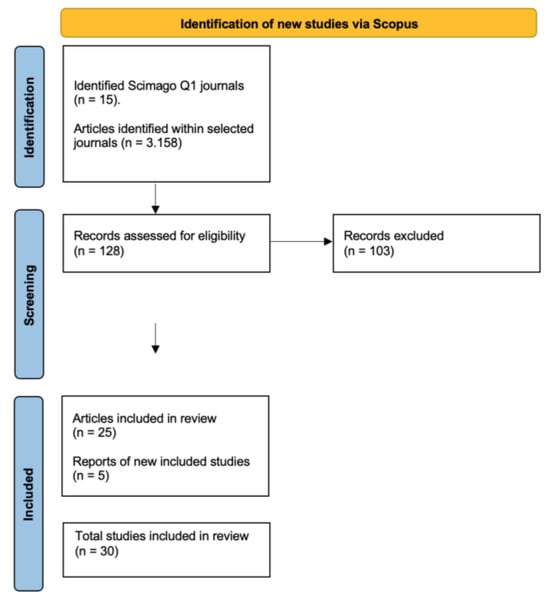
Figure 1
Open AccessArticle
Effectiveness of Digital and Analog Stress Management Interventions within Occupational Health Management in the Public Sector
by
Runa Maj Fasthoff, Lea Nolte and Timo Kortsch
Merits 2023, 3(4), 615-639; https://doi.org/10.3390/merits3040037 - 02 Oct 2023
Abstract
Stress increases among the working population in Germany. Workplace stress management interventions are therefore becoming increasingly important, especially in the public sector, which has a higher structural risk for work-related stress than other organizations. Currently, face-to-face formats dominate, but promising digital offerings are
[...] Read more.
Stress increases among the working population in Germany. Workplace stress management interventions are therefore becoming increasingly important, especially in the public sector, which has a higher structural risk for work-related stress than other organizations. Currently, face-to-face formats dominate, but promising digital offerings are being developed. The aim of this study was to investigate the effectiveness of a stress management intervention as a face-to-face and self-guided digital format, referring to the Job Demands-Resources Model. The preregistered study applied a randomized control group design in which N = 65 public service employees were assigned to face-to-face training, an online course, or waitlist control group. Participants completed online questionnaires before the intervention, shortly after the intervention, and six weeks later. Although trends for reductions in emotional exhaustion and perceived stress were evident among the intervention groups, mixed analyses of variance showed no interaction effects between the time and group on the outcomes. The main effects showed a significant decrease in stress levels regardless of the group and significant differences between intervention groups, with the online course reporting the lowest stress level. The results indicate that digital and analog stress management interventions can have desired effects within occupational health management. However, many unpredictable events (e.g., illness, vacation during the intervention) seem to influence the effectiveness in the workplace setting, and so further research is needed.
Full article
(This article belongs to the Special Issue HRM Leading the Way to Workplace Happiness)
►▼
Show Figures
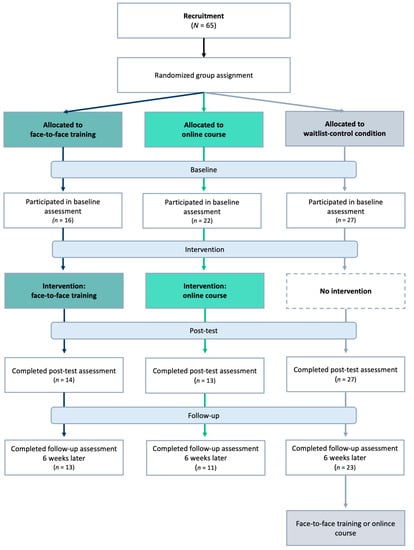
Figure 1
Open AccessArticle
Belbin’s Team Role Balance and Team Effectiveness in Community Mental Health Teams in an Area of Northwest Ireland: Implications for Leadership
by
Dimitrios Adamis, Georgia Maria Krompa, Abdul Rauf, Owen Mulligan and Edmond O’Mahony
Merits 2023, 3(3), 604-614; https://doi.org/10.3390/merits3030036 - 11 Sep 2023
Abstract
Community Mental Health Teams (CMHTs) have been introduced as an alternative to hospital-based treatment. Their effectiveness and the factors that may influence it have not yet been fully investigated. According to Belbin’s theory, a team is more effective if its members have diverse
[...] Read more.
Community Mental Health Teams (CMHTs) have been introduced as an alternative to hospital-based treatment. Their effectiveness and the factors that may influence it have not yet been fully investigated. According to Belbin’s theory, a team is more effective if its members have diverse roles. The aim of this study was to investigate if there is an association between CMHTs’ effectiveness and Belbin’s team role balance. Participants were members of eight CMHTs. The data collected were demographics (age, gender), discipline, years of experience, and team tenure. Also, the following scales were administered: the Belbin Team Role Self-Perception Inventory (SPI) and team effectiveness scale (TES). One hundred and six members participated. A significant correlation between team role diversity and effectiveness was found. Multilevel analysis showed that role diversity and being a doctor were the only two significant independent predictors of team effectiveness. Belbin’s theory is therefore applicable to CMHTs. The more diverse roles the members of a team have, the better the effectiveness of the team. Given that roles can be modified, team leaders need to be aware of the members’ roles and be able to modify them. Thus, they can increase the effectiveness of their teams.
Full article
(This article belongs to the Special Issue Leadership in the Workplace)
Open AccessArticle
Women’s Leadership and COVID-19 Pandemic: Navigating Crises through the Application of Connective Leadership
by
Chris T. Cartwright, Maura Harrington, Sarah Smith Orr and Tessa Sutton
Merits 2023, 3(3), 583-603; https://doi.org/10.3390/merits3030035 - 07 Sep 2023
Abstract
International and national crises often highlight behavioral patterns in the labor market that illustrate women’s courage and adaptability in challenging times. The COVID-19 pandemic and resulting changes in the workplace due to social distancing, remote work, and tele-communications protocols showcased women’s power of
[...] Read more.
International and national crises often highlight behavioral patterns in the labor market that illustrate women’s courage and adaptability in challenging times. The COVID-19 pandemic and resulting changes in the workplace due to social distancing, remote work, and tele-communications protocols showcased women’s power of authenticity and accessibility (interpersonal and personalized experiences) to engage with their constituents effectively. The catalyzed this research was our desire to underscore the importance of studying the impact of COVID-19 on women leaders. The COVID-19 pandemic brought to light specific challenges and disparities women faced in the workplace. It has been asserted that women leaders substantially benefit businesses and organizations and we wanted to test this out through the practices of our research participants. Decades of research reveal that women leaders enhance productivity, foster collaboration, inspire dedication, and promote fairness in the workplace. This article introduces the feminist Connective Leadership Model (CL) an integrative leadership model and one informed by early feminist theory for understanding women’s leadership during the COVID-19 pandemic. A mixed-method study of select US women leaders before and during the COVID-19 pandemic revealed the CL model and its efficacy for adaptive, inclusive leadership in various contexts. First, this article highlights the impact of the COVID-19 pandemic on women’s leadership and behavioral response to the crisis through the lens of the CL model. Second, this article delves into challenges the women leaders faced, including adaptive challenges, isolation, team management, increased caregiving responsibilities, and gender-related disparities. Third, this article reframes women’s voices articulated through a crisis management leadership framework coupled with an understanding and application of the behaviors defined through complexity theory which are aligned with the CL model. Finally, the article discusses the four ‘As’ of crisis leadership: authenticity, alignment, awareness, and adaptability. The application of the CL model provides an effective framework for determining the most appropriate leadership behaviors within the complex challenges of a crisis; it enables the leader to focus on personal, employee, and organizational well-being.
Full article
(This article belongs to the Special Issue Changing Realities for Women and Work: The Impact of COVID-19 and Prospects for the Post-Pandemic Work World)
►▼
Show Figures
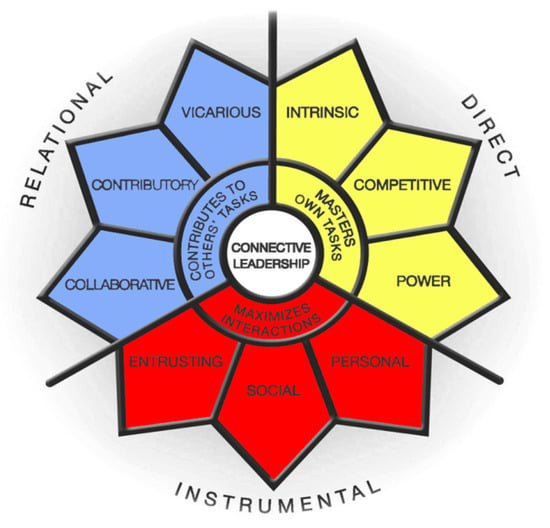
Figure 1
Open AccessArticle
Career Development of Early Career Researchers via Distributed Peer Mentoring Networks
by
Annika Martin, Julia Mori and Dominik Emanuel Froehlich
Merits 2023, 3(3), 569-582; https://doi.org/10.3390/merits3030034 - 04 Sep 2023
Abstract
This paper explores the challenges early career researchers (ECRs) face in academia and the benefits of being part of a distributed peer mentoring network. The study highlights the importance of social capital and emotional and motivational support in promoting wellbeing and career development,
[...] Read more.
This paper explores the challenges early career researchers (ECRs) face in academia and the benefits of being part of a distributed peer mentoring network. The study highlights the importance of social capital and emotional and motivational support in promoting wellbeing and career development, particularly during the COVID-19 pandemic. Using both qualitative and quantitative methods, the paper examines the impact of a collaborative environment on individual productivity and the development of clear goals. The study reveals that the supportive network of like-minded, ambitious people across borders and hierarchies offers the opportunity to identify with others and create a sense of belonging. The paper concludes by emphasizing the need for qualitative methods of social network analysis to investigate the meaning of social structures in the career development of ECRs.
Full article
(This article belongs to the Special Issue Feature Papers in Merits from Editorial Board Members)
Highly Accessed Articles
Latest Books
E-Mail Alert
News
Topics
Topic in
Education Sciences, Healthcare, Merits, Sustainability, Trends in Higher Education
Establishing Professional Competency and Talent Cultivation Strategies in the Post-Pandemic Generation Based on the Sustainability Education Development
Topic Editors: Chia-Li Lin, Chi-Yo Huang, Chihhung ChenDeadline: 1 March 2025

Conferences
Special Issues
Special Issue in
Merits
Current Research on Occupational Safety and Health
Guest Editors: Joseph A. Allen, Matthew S. ThieseDeadline: 15 July 2024
Special Issue in
Merits
School Management and Effectiveness
Guest Editor: Sophia AnastasiouDeadline: 31 July 2024
Special Issue in
Merits
People—the Next Sustainability Frontier
Guest Editor: Wendy M. PurcellDeadline: 30 September 2024
Special Issue in
Merits
Young People and the Labor Market: Challenges and Opportunities
Guest Editors: Enrico Marelli, Marcello SignorelliDeadline: 15 October 2024






